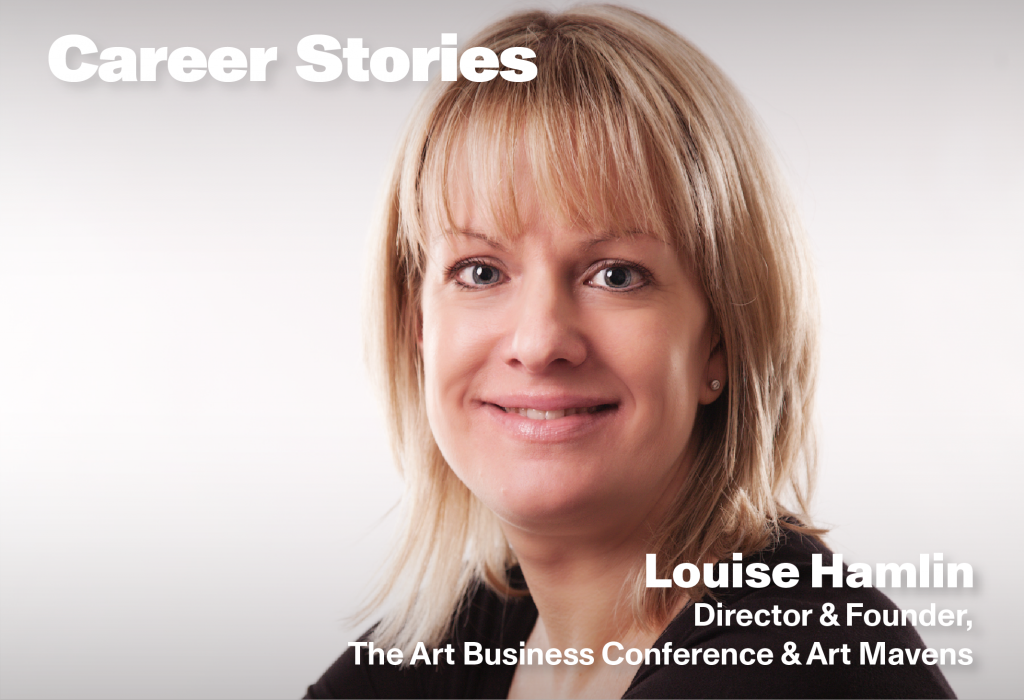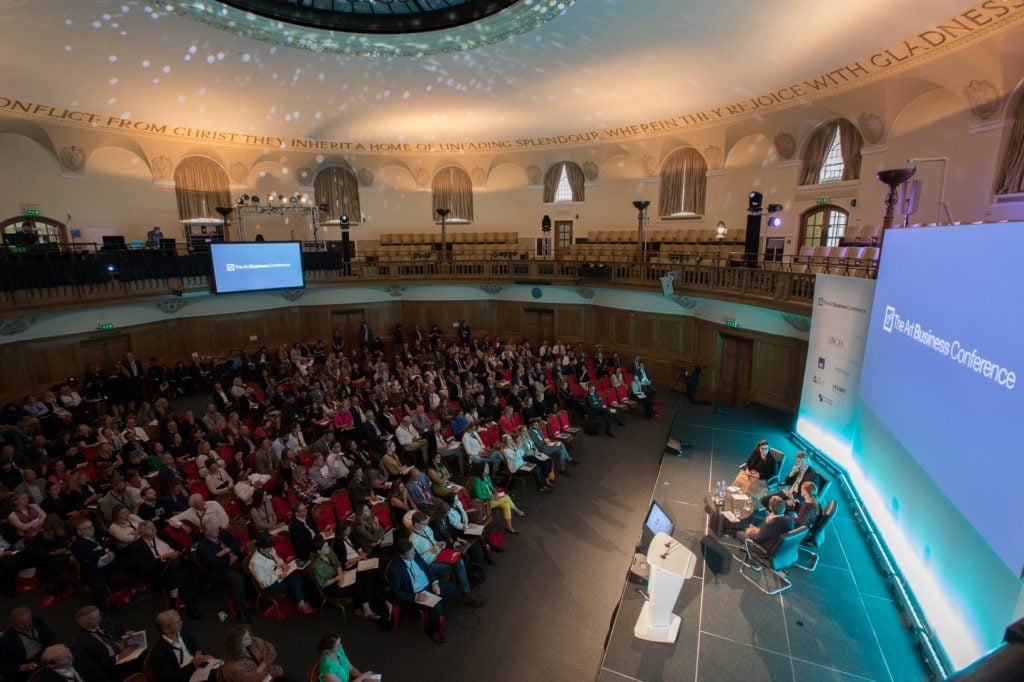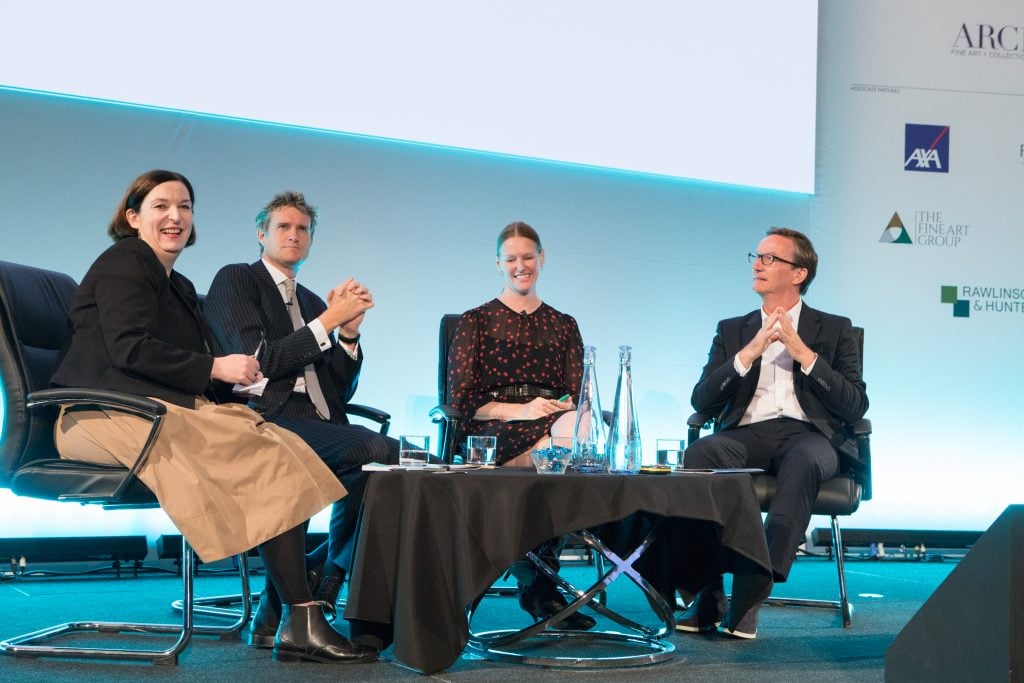Career Stories
How London Entrepreneur Louise Hamlin Is Leading Her Art Business Conference Into the Digital Future
Hamlin launched the Art Business Conference in 2014. Here's how she's taking it online.

Hamlin launched the Art Business Conference in 2014. Here's how she's taking it online.

Katie Rothstein &
Samantha Baldwin

Although she now heads a conference dedicated to the professional art world, Louise Hamlin’s career path was anything but linear. Time spent working in recruitment after studying at the Courtauld Institute pulled her away from art—but as she reflects today, it was ultimately “the best thing” she could have done.
“I firmly believe that for the art world to evolve, we need to encourage a greater diversity of talent from other industries with new skill sets and perspectives,” Hamlin says. After a long stint at The Art Newspaper, she went on to found Art Market Minds, a global events organization dedicated to planning conferences for art world professionals. In 2014, she launched the Art Business Conference in London, hosting collectors and professionals from around the world in response to “a growing professionalization within the industry.”
Read on to hear about Hamlin’s proudest achievements, greatest challenges, and the future of the Art Business Conference—and click here to register for our next Artnet Talks tomorrow at 12:30 EST, which will feature Hamlin and fellow art-world experts talking about career paths in the digital art world, and more.

At the Art Business Conference in London. Photo by David Owens Photography.
What is the mission of the Art Business Conference? Can you tell us about a typical conference day agenda?
The mission of the conference is to educate on the dynamics of the art market, with a focus on the operational side of running an art organization or art collection. The conference aims to bring together the various sectors of the industry to provide a 360-degree perspective of developments to encourage best practice.
A typical day will include an overview industry conversation, then deeper dives on specific topics. Recent topics have included: provenance, anti-money laundering, private museums, art and technology, and investment in art businesses, and, of course, there are plenty of opportunities to network.
How do you envision the future of the event?
The pandemic has had a huge effect on the Art Business Conference. Like so many other live events, such as art fairs, I am not able to run the conference, though I plan for the conference to go online later this spring. However, what was really important for me was that our community have an opportunity to network digitally, to continue to engage in meaningful art conversations and access new opportunities, which is why I have founded (together with Deborah Najar) our new online community app called Art Mavens. I hope at some point to be able to return to a 400-attendee, real-life conference setting, but only when it is safe to do so. However, when it returns, the possibility of a fully digitally integrated conference and event experience with the Art Mavens app is hugely exciting.
What changes do you expect to see in the art business five years from now?
The pandemic has fast-forwarded digital innovation, which has been one of the main discussion points of recent Art Business Conferences. It’s been great to see many of these organizations able to accelerate their business models, and I hope the next five years will see significant investment from both within and beyond the art world to enable these digital products to develop and evolve their product offerings. I also hope for the industry that, within the next five years, we will see a greater move toward standardization in practices such as authentication and provenance.

Jane Morris, Tristram Hunt, Jennifer Schipf, and Thaddaeus Ropac at the 2019 Art Business Conference. Photo by David Owens Photography.
You once said that you would like to “start an online campaign to rewrite a new global art history.” What does an inclusive art history look like to you?
In February 2020, Yale University announced it would no longer run introductory survey courses on Western art, and that art history is a global discipline. I share the view that the canon of Western art history is an outdated notion. Art Mavens would like to foster a dialogue of truly international voices and perspectives on a global art history within our audience of art professionals, including art historians, writers, and academics.
What is your proudest accomplishment in your career thus far?
The transition from working with the security of a full-time job and salary to starting my own business, Art Market Minds, back in 2014, without any financial backers, with a young family, and making it work was perhaps my proudest accomplishment. Looking back on it, I realize how important time management skills were, coupled with a positive and determined mindset, something that has been so important to focus on again this past year.
What has been the biggest challenge you have faced in your career?
Without doubt, this past year has thrown us all a huge curveball, and especially those whose core business is live events and conferences. I think the hardest thing has been the uncertainty—how can you write a business plan when you aren’t legally allowed to host your events? However, having been in the start-up phase previously with Art Market Minds, I also view it as an exciting new chapter.
What is one piece of advice you would give your younger self at the start of your career?
Taking your first steps out of college and into any career can be extremely daunting. Especially when many of my contemporaries were continuing with post graduate studies, and I felt insecure about not continuing formal studies. The reality, however, was that from the day I started my art career, each day has been a learning experience, whether on the operational side of running a business, understanding the quirky dynamics of the art world, and now the intersection between art and tech as I enter the next phase of my career.
The advice I would give myself at the start of my career is that, ultimately, your learning journey, both professionally and personally, has just begun.
This interview has been edited and condensed.
Hear from Louise Hamlin tomorrow at the next Artnet Talks as she talks about charting a career in the digital art world alongside Tatiana Berg, social-media manager at Art Basel; Sean Green, co-founder of art-world customer relationship management startup ARTERNAL; Annie Wang, head of marketing for Artnet; and Art Market Mentors co-founder Caroline Sayan.